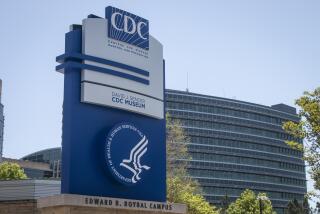A Faltering Confidence in the Call for Calm
- Share via
WASHINGTON — The anthrax skin infection in a New Jersey bookkeeper not only calls into question health officials’ reassuring messages about the disease, but could also force the government to significantly rethink its battle plan.
The infection was announced Monday, just hours after federal officials told the nation that there was almost no chance that they could contract the disease if they had not handled an anthrax-laced letter.
Doubt has now been cast on that theory. The 51-year-old woman is not a postal worker or a mail room employee. She doesn’t work for a media company. And she doesn’t recall handling any suspicious package at home or at work.
Federal officials declined to speculate on how the woman was infected. The case raises the possibility, however, that she received a letter that was “cross-contaminated,” meaning it somehow acquired anthrax spores from a contaminated letter sent through the same postal center.
If the woman was indeed infected by cross-contamination, “that will clearly cause some rethinking” of the government’s approach to this problem, said Dr. Linda Rosenstock, dean of the UCLA School of Public Health. “It means that the public would be in a different situation than we had thought.”
If the government concludes that it has defined too narrow a circle of exposure, officials might significantly expand prevention and treatment measures, including the distribution of antibiotics.
But health officials cautioned Monday that they don’t know how the woman was infected.
What most troubles some experts is what they consider a pattern of premature reassurances on the part of the government.
“The ineptitude of the response of our officials to this is unbelievable,” said Helen Schauffler, executive director of the Center for Health and Public Policy Studies at UC Berkeley. “They keep giving these false reassurances, and all it’s doing is undermining their credibility.”
Rosenstock said senior health officials’ comments “have sometimes swung to more certainty than we probably have. Being honest about what we don’t know and [do] know is critical. I don’t think we have been consistently good with information.”
This is not the first time that unfolding events have raised doubts about the government’s message. Earlier this month, public health officials said postal workers faced little risk of contracting anthrax from unopened envelopes. Less than a week later, two Washington, D.C., postal workers died of the inhaled form of the disease.
Acting New Jersey Health Commissioner Dr. George T. DiFerdinando Jr. said the public should expect differing statements as new facts emerge. “People expect and deserve honesty from us. That’s what they’re getting. Sometimes that’s confusing because the fact patterns are changing.”
At the Centers for Disease Control and Prevention in Atlanta on Monday, spokeswoman Cynthia Glocker said officials are still trying to understand what has happened in New Jersey.
“Right now we’re grappling with it, and we are sending people to New Jersey to get on the ground,” she said.
Early Monday, at two news conferences, federal authorities said there was little reason to think--based on disease reports and tests at post offices--that the general public could become ill from letters that have merely touched mail contaminated with anthrax.
Teams have tested 300 samples from 22 post offices that sort nongovernmental mail, and only one has come back positive.
“That suggests to us that it’s starting to look like nongovernmental mail was minimally affected by this, so far,” said Dr. Pat Meehan, director of the CDC’s environmental hazards division.
Sounding a more cautious note Monday night, Glocker said, “While it is not possible to eliminate the risk of anthrax, the risk to the general population is low and can be further reduced by being alert for specific packages and by hand washing after opening mail.”
Postal workers have consistently said they are concerned that anthrax-tainted letters may be contaminating other mail.
They “are concerned both for themselves and for the purpose of assuring the customers that [anthrax] is not traveling through the equipment and into the mail and causing widespread anthrax spores,” said Mark Van Wagner, vice president of the National Assn. of Letter Carriers, Branch 380, in Trenton, N.J.
DiFerdinando cautioned the public not to overreact to the latest confirmed case in New Jersey.
“While none of us are unmindful of possible implications here, I think we really have to show resolve in letting the facts lead us to what the case is and then we will deal with it,” he said. “We need to be fact-based. All of us need to be ready to deal with things as they come up.”
More to Read
Sign up for Essential California
The most important California stories and recommendations in your inbox every morning.
You may occasionally receive promotional content from the Los Angeles Times.













